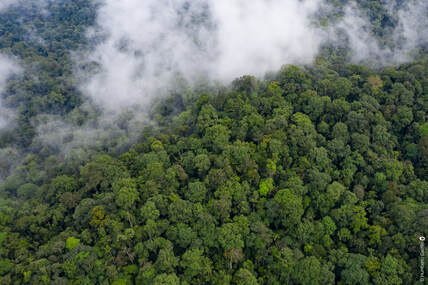|
What do you save from your home when the cyclone comes and waters rise? How do you respond when, out of necessity, your parents work for a logging company that threatens global warming and the last remaining Brown-headed Spider monkeys on earth? These are the types of uncertainties faced by young people living in the Sundarbans delta of northeast India, and the lowland Chocó in the north of Ecuador. In a new research study, we are working with partners in these two regions, with Dr Anindita Saha and Dr Citlalli Morellos (Tesoro Escondido Reserve), to support young people to reflect deeply on how they experience and connect to their local sustainability issues.
In each region, researchers and artists are working with young people aged between 12 and 20 years old. Using creative and interactive activities — such as drawing, mapping and film-making — young people are encouraged to engage with a complex range of thoughts, feelings and opinions that they might have. They can explore their experiences of sustainability through a range of different lenses, by:
The young people will be able to create artworks for themselves that suggest how they make sense of sustainability issues. They will exhibit their art locally. Those in the community will be invited to come along and look at, and talk about, the artworks with the young people who have produced them. There will be plenty of opportunities for discussion and deliberation. The purpose of this will be for everyone to consider any actions they may wish to take to address sustainability issues. The interdisciplinary research team working on this project is trying to mirror the creative, deliberative approaches of the young people. This means that they are required to bring their different disciplinary knowledge together. Researchers from education, life sciences, environmental history and the arts will work, learn and challenge one another over the next few months in new and unfamiliar ways.* Entitled Hope in the Present, the aim of the research is to find out whether using creative and deliberative approaches might shift young people’s sense of hope: through attending to what is worth preserving in their everyday lives and by identifying possibilities for taking action with others. * The research team includes those at the University of Sussex: Dr Rebecca Webb and Dr Perpetua Kirby (Education and Social Work), Dr Mika Peck (Life Sciences), Prof. Vinita Damodaran (Environmental History), Zuky Serper (artist), Tiffany Yan Wong and Juno Zhou (Childhood and Youth, Masters students). The Indian team: Dr Anindita Saha (museum and curation studies), Biswajit Mahakur (educationist) and Khitish Bishal (artist). The Ecuador team: Dr Citlalli Morelos (life sciences), Paola Ponciano (educationist) and Kata Kárath (filmmaker). Advisers: Prof. Janet Boddy (Education and Social Work, University of Sussex); Prof. Ian Scoones (Institute of Development Studies, University of Sussex), Prof. Paul Basu (anthropologiest; curator; film-maker; School of Oriental and African Studies, London). The research is being funded by International Development Challenge Fund (IDCF) & Sussex Sustainability Research Programme (SSRP), financed by the University's Global Challenges Research Fund (GCRF) allocation. The title, ‘hope in the present’, is borrowed from Naomi Hodgson, Joris Vlieghe and Piotr Zamojski’s Manifesto for a Post-Critical Pedagogy.
0 Comments
Leave a Reply. |
AuthorPerpetua Kirby & Rebecca Webb Archives
November 2023
Categories |

 RSS Feed
RSS Feed